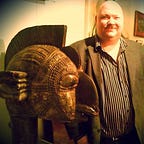We recently had a kind family donate a relic of the Hoodoo curio culture to the West Tennessee Museum of Southern Hoodoo History. Manufactured curio culture is important historically because it is evidence of how African-American spiritual practices affected consumerism even when replicated in the arena of commercialism.
The donation consisted of a cardboard box used to display Skippy’s Lucky Dream Books. The box is decorated with several images including stacks of dollar bills, a cornucopia, a ‘lucky star’, a genie rising from a bottle, the zodiac, two hearts and the word ‘love’ as well as a bearded ‘holy man’. It is interesting to note that there are no illustrations of African or African-Americans on the box and the genie appears to be a white European. This aesthetic was once used among the labeling of many curio companies that sought to promote elements related to African-American culture to white audiences.
There is a symbol of a circle on the box containing the words ‘Love’, ‘Success’, ‘Health’, ‘Wealth’ and ‘Spiritual Power’. In the center of the circle is an image of a horseshoe decorated with the word ‘Fortune’. An all seeing-eye looks over the horseshoe and the message ‘Good Luck’. There is also an image of a cat’s head with the words ‘A Hit!’
The issue of cat imagery and names became an issue in court with the company in 1982 when a New York based company known as Val Publishing argued that they owned the rights to the words ‘Black Cat’ that was being used in the company’s numerology publications. Skippy changed their name of the publication from ‘Black Cat’ to ‘Big Cat’. The image of the ‘holy man’ seen on the side of the box was registered with the U.S. Patent and Trademark Office by the company in 1978. It appears on many of the company’s products.
The box contained several slots that were used to hold and promote various dream books in retail shops. Dream books were very popular among candle and spiritual supply shops in the Mid-South region and in this case were sold in a local pharmacy.
Who was Skippy’s Candle Corporation?
Records show that the company was incorporated in Detroit Michigan in April 1969 by David Adler. The company also operated as Skippy’s Candle and Incense, Detroit Candle Company and the Skippy Corporation. Carolyn Morrow Long in her book Spiritual Merchants: Religion, Magic and Commerce shares that in 1987 owner David Adler and businessman Marty Mayer purchased the curio company International Imports which later became Indio Products after a split between the businessmen in 1991.
Some of the dream books sold by Skippy’s included Skippy’s Lucky Lottery Dream Book and the Fast Luck Daily Lottery Dream Book. In 1977 the company sold the Lucky Lottery Dream Book with three lucky numbers for $5 and included two free lottery tickets with the purchase. In January 1979 Michigan lottery officials asked lottery agents not to sell a specific copy of Skippy’s dream book as it had an image of an official lottery ticket on the cover of the book. Officials complained that this might be misconstrued by customers as being an official document from the lottery itself. Officials later sent Skippy’s a letter denying them permission to use the image on the cover of their books.
Skippy’s also sold candles, oils, powders, sprays and incense to retailers including the Double Action Lucky Number Candle, Money Drawing Incense, Black Cat Protection Spray and Gold Dust Good Luck Powder.
Artifacts like this display box gives us some insight into the marketing of curio products in the Mid-South. It tells us about geographic locations of these products that potentially could have affected local practices. Intentionally or unintentionally it speaks to the evidence of the demand for spiritual products often embraced by a surviving culture that began in Africa.
